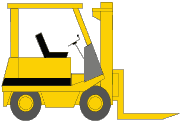What are the most frequent causes of downtime?
The two most frequent causes are operator abuse of the equipment and lack of regularly scheduled
preventive maintenance.
How do operators abuse the equipment?
The list is endless but here are a few of the most common occurrences:
- Failure to check fluids on equipment on a regular basis.
- Failure to use the inching pedal when shifting from forward to reverse
- Gunning the engine
- Using the forklift to "push" pallets, trailers, or equipment. Forklifts are
designed for lifting not pushing or towing.
- Loading Over the rated capacity of the unit.
- Continuing to use the equipment even though there is a known problem with it, this often leads
to a major problem developing.
What can we do to reduce abuse?
- The first step is to make the operator part of the preventive maintenance process. Many
companies have a checklist that the operators are expected to fill out on a weekly basis. This checklist
includes checking oil levels and safety devices. It also includes space for the operator to make the supervisor
aware of any known problems with the unit.
- A second step, in cases were you have a large fleet and frequent abuse of the equipment is suspected,
would be to have us install devices on the units which are designed to detect abuse such as operators crashing
the units into each other or into other objects. Devices to limit who can drive which unit, etc.,
- Installation of high visibility strobe lights and OSHA approved backup alarms can also increase
visibility and decrease the chances of a collision. These items not only help but are required by OSHA on all forklifts.
Why are repairs performed in-shop so expensive?
- When a forklift is sent to the shop for service, it is usually because the job is labor intensive
and possibly parts intensive as well. In many cases the unit may require more than one mechanic to be involved
on the job simultaneously.
- Many customers are under the impression that they will save money if they have the forklift
company perform these jobs on site. This is a fallacy, since due to the complexity of most of these jobs,
a fully equipped repair shop is required. An in many cases the bill would increase since mechanics would
be required to run back and forth from the customer site to the shop, getting necessary tools and supplies.
What benefits will be derived from regular PM
By performing preventive maintenance at the recommended scheduled intervals you
can expect to see (among many other things):
- By replacing engine oil at regular intervals you reduce unnecessary heat and wear to the engine.
- Maintaining proper transmission oil and drive axle levels, is crucial to the grueling operations
that a forklift is asked to perform.
- Lubricating parts that slide against each other, such as mast components, steer axle components,
steer tires, sideshifter attachments etc., GREATLY reduces wear and tear on the equipment.
- Maintaining the correct battery water level, and proper charging of an industrial battery (for
electric forklifts), can mean the difference between having and not having the motors work in the unit a couple
of years down the road. Electric forklifts are very sensitive to low battery voltage, and all components
will run hotter and fail more frequently if you are using an old or poorly maintained battery.
FORKLIFT OPERATION
AND SERVICE.
BE SURE TO VISIT THE HOME PAGE FOR INFORMATION ON LIFT TRUCKS REPAIR, SERVICE, TROUBLESHOOTING,
AND EVERYTHING YOU NEED TO KNOW ABOUT FORKLIFTS AND THEIR USE.
|



